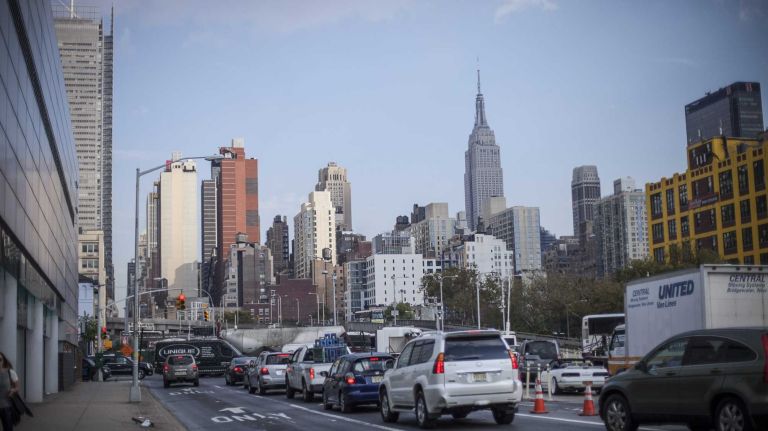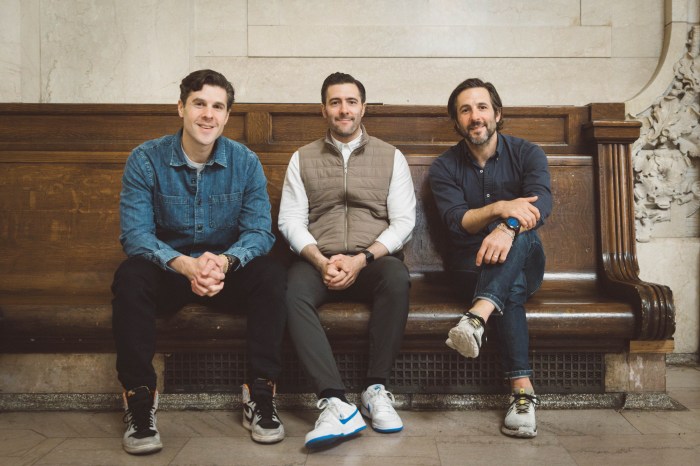The Garment District Alliance is gearing up to make some changes after an influx of resettled homeless people took up residence in Midtown hotels.
According to Barbara Blair, president of the Garment District Alliance, out of the 13,000 displaced homeless people in New York City the Midtown West area (Garment District, Hell’s Kitchen and 34th Street Partnership) had 4,300 of those people resettled in hotels. The area also has a methadone clinic, a needle exchange facility and previous homeless shelters and drop-in shelters, as well as two major transit hubs in the Port Authority bus terminal and Penn Station.
Blair says that dropping this high number of individuals is adding problems to an area that already has “social issues.”
“The life in the public realm has degraded to such a point that people are scared,” said Blair. “People call me every single day of the week because they are either verbally assaulted — I won’t say physically assaulted but there have been some physical assaults — verbally assaulted or intimidated.”
Blair then stated that many of the hotels where the resettled people are staying in are budget hotels that don’t have a lot of public space, leading the people to hang out on the streets. Blair also says that with more people in this area, their friends are more likely to come and crowd up the area to either party or do/sell drugs in the area.
“We have been working with our local community boards and my peers at other BIDs and the elected officials to express how really disconcerting this for the people that live here and that work here,” said Blair. “We’ve had a number of meetings that were attended by the Department of Homeless Services. I will say that I find the response wholly inadequate from the providers that are running these hotels. What we’re trying to do is get the providers to work together as a team.”
Blair acknowledged in the meeting that although social services are offered to those living in the hotels, many don’t accept them for a variety of reasons.
To combat these issues, the Garment District Alliance hired 12 private security guards from a service to help maintain order on these streets alongside their already hired guards for the Alliance itself. These newly hired guards will not have the power to arrest anyone or carry weapons but act more as ambassadors for the community.
The Garment District Alliance hopes to be able to hire an NYPD detail to patrol the area, however insurance issues are preventing that from happening at this time.
The Alliance will also be setting up “safe corridors” along 7th and 8th Avenues where during commuter hours, each block will have one of the new security guards as well as one of the Alliance’s usual security guards. Street patrol is being increased to 8th Avenue. Sanitation workers will carry radios to alert the security team if needed, and the security guards will act as escorts to those who are leaving work to go use the subway.
A total of 18 phone booths have been removed from the area to discourage the individuals from doing drugs in them, and there are talks of shutting down the phone charging kiosks in these areas to cut down on the amount of people around them.
According to Inspector Brendan Timoney, commander of the NYPD’s Midtown South Precinct, bail reform is part of the reason why the people are on the streets because they are given desk appearance tickets, and that there are a handful of hotspots in this area of Midtown that require more officers due to the influx of people.
“We need the help of the community with this, we have to get out to our constituents in the area that this is unfair that they put this amount of people into the shelter system in such a small, condensed area,” said Timoney.
“New York City was in the midst of a homelessness crisis when the pandemic hit, and COVID-19 made matters even worse,” said a spokesperson from Council Speaker Corey Johnson’s office. “The Speaker’s office is aware that there have been numerous issues in the area, and is working with the community to address these concerns. As a temporary solution, moving people into hotels was done as a life-saving measure because of this unprecedented pandemic.”
Hoteliers spoke out at the meeting, some of whom expressed shame with the hospitality industry, but acknowledged that they are making an effort to remove people from the hotels that are not registered as guests.
“Every day we must kick out half a dozen to a dozen people who try and get to the floors and do not belong,” said Jennifer Austin. “We’ve been cursed at, we’ve been threatened because we don’t allow parties to happen. We can do a better job as hoteliers and we can stop selling $65 rates because there is a sweet spot of getting actual people who just need to escape their whatever and want to stay in a hotel room and it’s not $65. I am ashamed of the hospitality industry right now.”




































